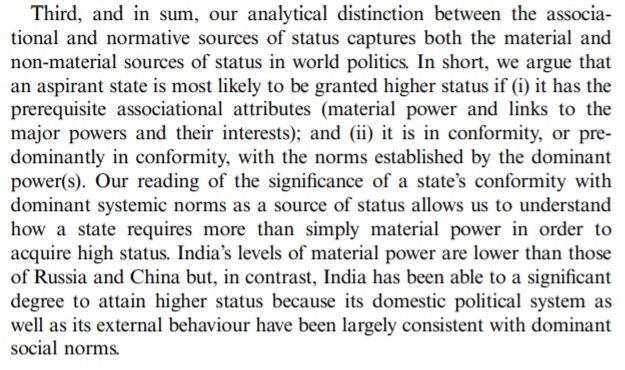

Thread on why India's foreign policy is not all about "interests"...
Or, framed another way: why India has (had) higher status than China, despite having less material power, and why that "edge" is now in doubt
As this useful piece argues:
"India’s reputation had long been the soft power capital it deployed to meet its hard power shortfall as it pursued its internat'l ambitions. As that reputation suffers, the country’s options lessen & effectiveness shrinks" https://www.thehindu.com/opinion/op-ed/dangers-of-hard-sovereignty/article33795459.ece
"India’s reputation had long been the soft power capital it deployed to meet its hard power shortfall as it pursued its internat'l ambitions. As that reputation suffers, the country’s options lessen & effectiveness shrinks" https://www.thehindu.com/opinion/op-ed/dangers-of-hard-sovereignty/article33795459.ece
"Soft power capital" & "reputation" are slippery concepts. In our 2017 book, Rising India: Status & Power, Rajesh Basrur & I make a similar argument - that  's ambitions are served not just by its material rise but also by conformity with key norms of liberal int'l order
's ambitions are served not just by its material rise but also by conformity with key norms of liberal int'l order
 's ambitions are served not just by its material rise but also by conformity with key norms of liberal int'l order
's ambitions are served not just by its material rise but also by conformity with key norms of liberal int'l order
Rather than assume that as India's material power grows, conformity with these norms can be dispensed with, it's clear that the issue is not just relative power but *social status*: perceived belonging in a social group (ILO) whose norms defined by its dominant members
For  the key to higher status has been not only material acquisition but identity as a democracy (now in question); responsible or restrained conduct with military/nuclear assets; integration into the global capitalist economy & closer relations with conferrers of status (
the key to higher status has been not only material acquisition but identity as a democracy (now in question); responsible or restrained conduct with military/nuclear assets; integration into the global capitalist economy & closer relations with conferrers of status ( )
)
 the key to higher status has been not only material acquisition but identity as a democracy (now in question); responsible or restrained conduct with military/nuclear assets; integration into the global capitalist economy & closer relations with conferrers of status (
the key to higher status has been not only material acquisition but identity as a democracy (now in question); responsible or restrained conduct with military/nuclear assets; integration into the global capitalist economy & closer relations with conferrers of status ( )
)
It is India's efforts to demonstrate conformity to the dominant norms of the ILO that have led to its higher status. Yet integration into that order presents plenty of problems. For example...
India's efforts to conform to the global nuclear order have resulted in its partial accommodation, but effectively the nuclear hierarchy is unchanged at a legal level & India is closed out from any kind of management or norm-setting role within the regime https://www.researchgate.net/publication/340816134_Understanding_India's_Exceptional_Engagement_with_the_Nuclear_Non-proliferation_Regime
Ironically, greater integration into the economic commitments of the liberal international order (which at one level is status enhancing), has contributed to the erosion of Indian democracy, as @rkadelhi shows, https://theprint.in/opinion/narendra-modi-hindutva-nationalist-illiberal-saffronisation-brand-india-democracy/527760/
As Inderjeet Parmar writes of the US-led ILO, "this system & its leaders cannot yet comprehend an order that encompasses... [on the basis of equality] the broad mass of people—citizens—at home, let alone the non-western peoples of the global South, or even their elites"
The tensions inherent to the ILO and their handmaidens within the Indian state have served to damage India's status & capacity to enact changes from within the ILO that bring greater diversity, inclusion & equality.
What is clear is if world politics is in flux &  has a greater opportunity to co-lead and inject new norms and values than since independence, then...
has a greater opportunity to co-lead and inject new norms and values than since independence, then...
 has a greater opportunity to co-lead and inject new norms and values than since independence, then...
has a greater opportunity to co-lead and inject new norms and values than since independence, then...
 will need to continue to demonstrate some social solidarity with high status states (conformity with dominant norms); & crucially, introduce what small state followerships & a wider
will need to continue to demonstrate some social solidarity with high status states (conformity with dominant norms); & crucially, introduce what small state followerships & a wider  citizenry feel membership of the ILO could not deliver: greater equality locally & globally.
citizenry feel membership of the ILO could not deliver: greater equality locally & globally.
And to get back to where I started (and not just because I am in a dentist waiting room and forgot to add this ):
):
 ):
):

 Read on Twitter
Read on Twitter





